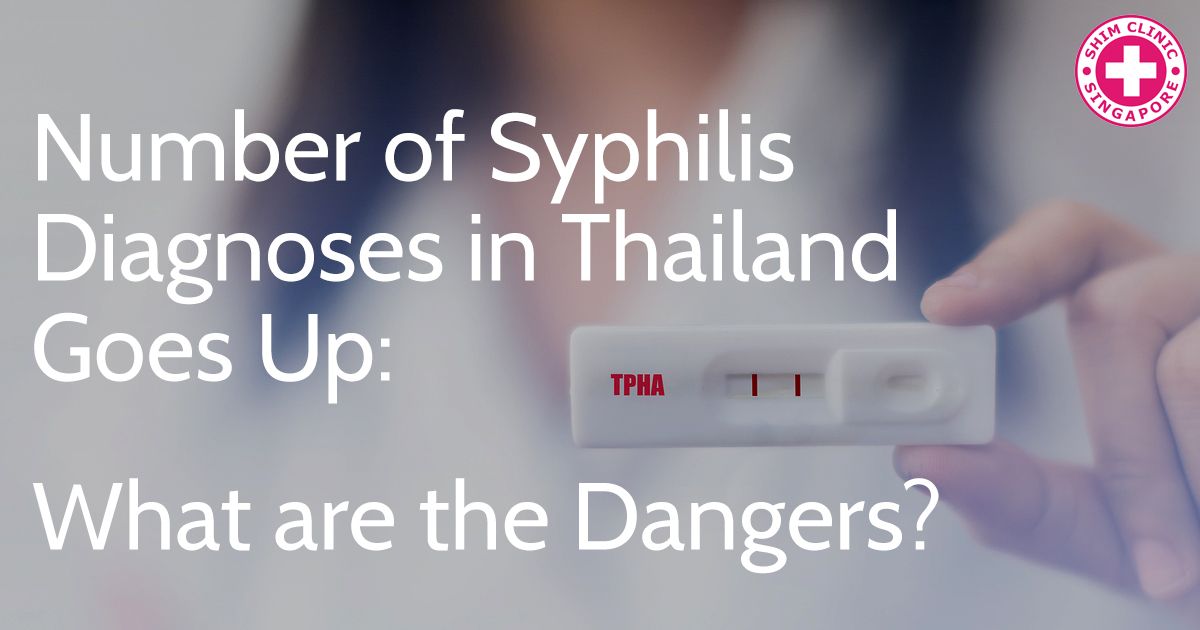Thailand, a favourite tourism destination among Singaporeans, has recently announced a significant increase in the number of newly diagnosed syphilis cases. Here are some of the most important facts and the reasons why this announcement is sounding a warning among the medical community.
Unsafe Sexual Practices = High Syphilis Prevalence
According to the Thai Department if Disease Control (DDC), the rate of syphilis infections in Thailand is increasingly rapidly. The biggest number of new cases has been diagnosed among those aged 15 to 24.
Experts believe that young adults are engaging in unsafe sexual practices, which is contributing to the effortless spread of the infection. Thailand has been seeing a steady increase in the number of new syphilis cases since 2013. In 2018, the number of new diagnoses in the mentioned young adults age group was 36.9 per cent higher than the number of new syphilis cases in 2017.
Many young people in Thailand believe that condom use is only required when engaging in intercourse with sex workers. Thus, unsafe sexual practices happen to be rampant among the country’s youngest and most vulnerable population.
Thailand has already made international headlines on the basis of the latest STD “epidemic.”
One of the latest diagnosed cases involved a 14-year-old teenager who also happened to be pregnant at the time the syphilis infection was confirmed.
This latest announcement suggests another trend that the Thai health authorities have been monitoring for a while – a much younger age at which individuals are becoming sexually active. Statistics suggest that many teenagers in Thailand have their first experience at the age of 13 to 15. Additionally, 30 per cent of these first sexual experiences take place without the use of condoms or reliable barrier contraception.
What Is Syphilis and Why Is It Dangerous?
Syphilis is one of the most common sexually transmitted infections in the world.
It is caused by a bacterium called Treponema pallidum. When left untreated, this infection could contribute to serious complications and it is especially dangerous in the case of pregnant women.
According to the World Health Organization (WHO), syphilis in pregnancy is the second most prominent cause of stillbirth and it could also contribute to premature birth, low birth weight, infections in the newborn and even neonatal death shortly after the birth.
As per WHO statistics, over one million pregnant women across the globe had an active syphilis infection in 2016.
At the same time, five per cent of sex workers aged 18 to 31 were also positively diagnosed with the infection. In Thailand, 0.7 per cent of the sex workers carry an active syphilis infection, as per the WHO statistics.
The numbers, however, could be somewhat misleading. There are no comprehensive registers and many people do not report the fact that they’re actually sex workers. Some of these individuals do not undergo regular STD testing, which means that the rate of infection could be much higher than what’s actually been reported officially.
Syphilis can be spread easily through unprotected sexual contact. Eventually, infected individuals will see the development of sores in the genital region. For a long period of time, however, the infection will remain asymptomatic. Getting STD screening would be the only way to determine early enough whether an active infection has been acquired.
Testing is so incredibly important for another simple reason – syphilis is easy to treat through the use of the right medications. According to medical professionals, syphilis is easy to cure in every stage. The right antibiotics will get rid of the bacterium. The treatment, however, cannot rectify the damage that the infection has already caused, especially if a diagnosis occurs at a later stage.
The Link between Syphilis and HIV
Thai authorities and medical professionals in Singapore constantly stress the importance of safe sexual practices and using a condom. These practices are applicable for all individuals and especially for those going on a vacation to enjoy casual sexual encounters or to use the services of sex workers.
Syphilis is sufficiently dangerous on its own but there’s an added characteristic that makes the infection even more devastating.
Research suggests that a syphilis infection increases the risk of contracting HIV during unprotected sexual encounters.
The genital sores caused by syphilis provide an easy entry for the human immunodeficiency virus into the body. Research estimates that the risk of contracting HIV when you already have a syphilis infection increases by anywhere between two and five times.
US statistics show that four in 10 men who have sex with men with syphilis are also HIV-positive. These numbers are too important to ignore or underestimate. If you engage in risky behaviour, you should do the right things to protect your health and demonstrate a responsible attitude towards your sexual partner(s).
The first and most important thing to do is to use condoms during all kinds of sexual encounters.
Secondly, regular STD testing is a must. High risk individuals (those who have casual sex with strangers, individuals that do not use condoms, men who have sex with men) should get STD testing at least two times per year.
Finally, HIV PrEP is a good choice for men who have sex with men and those at an increased risk of contracting HIV or syphilis. PrEP is a therapy consisting of antiretroviral medications that are taken for a specified period of time to reduce the risk of contracting the HIV virus.
If you’ve already had a sexual encounter without the use of reliable contraceptives, you may want to opt for HIV post-exposure prophylaxis or PEP. HIV PEP has to be administered in the first 72 hours after the contact and it reduces the risk of contracting HIV by as much as 90 per cent.
Shim Clinic offers STD and HIV testing, as well as HIV PEP and PrEP. Please don’t hesitate to contact us or visit our std clinic during open hours every single day of the week.


Pingback: Syphilis Infection Rates Increase Across the Globe